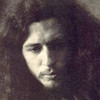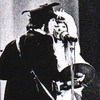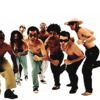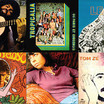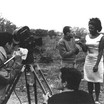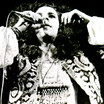Ilumencarnados seres
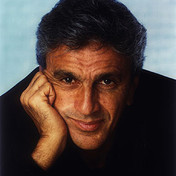
caetano veloso
Interviews
Ana de Oliveira – Before the release of “Alegria, Alegria” and “Domingo no Parque”, Gil and you were already talking about the need of a Brazilian Popular Music renewing movement.
Caetano Veloso – We were already talking about it in 66. In the inner cover of the album Domingo it’s written: I’ll sing these songs that I wrote at ease some time ago because now I’m thinking about completely different things and projects. Gil had already had some meetings with other composers and musicians in Rio to try to spread the new way of seeing things. Gil wanted everyone to participate but they didn’t understand it. I’d been talking a lot with Rogério Duarte about the fact that the popular music composers in Brazil lacked the capacity to risk and were confined into the good-taste and politically correct world of the time. About the prejudice against rock and iê-iê-iê, which, in spite of not interesting us very much in the beginning, had a vitality that we discovered little by little.
Ana de Oliveira – When did you hear the word Tropicália for the first time?
Caetano Veloso – At a lunch in São Paulo, uttered by Luiz Carlos Barreto, in 1967. The album was almost ready and the song had already been recorded, but had no title yet. Luiz Carlos asked me to sing new songs. When I sang this one he was marveled. He found it similar to the film Terra em Transe and to the work by an artist from Rio, Hélio Oiticica, called “Tropicália”. He said I should give this title to the song. I told him that I knew neither the person nor the work of art and that I would not give someone else’s work title to my song. The person might not like it. Manoel Barenbein, the producer of the album, loved it and immediately wrote: Tropicália. It was meant to be temporary, but it stayed there.
Ana de Oliveira – It seems that the term Tropicália has always pleased you more than Tropicalismo, right?
Caetano Veloso – Yes. The suffix “ismo” (“ism”) by itself sounds a little boring, but I got used to it later.
Ana de Oliveira – What meaning of the word Tropicalismo did you grasp and reject?
Caetano Veloso – Tropicália sounds like something alive, in progress. Tropicalismo sounds academic, a movement in the conventional sense of it. I was not so much attracted to the idea of Tropicalismo, because this name conveyed the impression that we wanted to make tropical business in Brazil, from Brazil. I didn’t want the movement to be characterized like that, it intended to be internationalist and anti-nationalist. It had more to do with the universal sound, another designation that we heard and adopted for a period, related to Marshall MacLuhan’s idea of a global village, highly in vogue at the time. We were very interested in space conquests, rock’n’roll, electronic music, that is, in the avant-gardes and entertainment industry. It was all experienced as an international novelty that we wanted to address sort of unabashedly. Nowadays, though, I think the name couldn’t have been more correct.
Ana de Oliveira – What was Tropicália’s origin?
Caetano Veloso – I’d say it resulted from the encounter between Gilberto Gil and Caetano Veloso’s personalities. Without him, I wouldn’t make music, let alone this whole thing inside music. Still, once I was inside music – specially because of Gil – I ignited a movement so responsible for the popular music issue in Brazil only because Gil himself was very excited for something like that to happen.
Ana de Oliveira – I once told Gil: you, Gil, are the antenna and Caetano the leadership. Do you agree?
Caetano Veloso – Yes, maybe. I have the ability to finish articulating the elements. Many of them were brought by myself, but many weren’t. I brought many things from my conversations with Bethânia, with Rogério, which only happened because I am who I am, with my own thoughts, with what I observed and felt. But the final organization of these elements into a project sprang from Gil’s intuition. Gil suggested that we talk about the Beatles and mass culture.
Ana de Oliveira – Besides that, Gil also suggested that you talk about the things from Pernambuco he’d seen and been enthusiastic about.
Caetano Veloso – Exactly. The popular art from Pernambuco and Brazil’s social and political situation at that time. The mixture of the will to act in History with the hearing of “Banda de Pífaros de Caruaru” and the consciousness of the Beatles role in mass culture, this conjunction set Gil’s mind on fire.
Ana de Oliveira – How did you react to Gil’s stimulus?
Caetano Veloso – As soon as I felt engaged in his proposition, I organized this stimulus into a coherent intellectual structure. I created a coherent language for that and in this sense I exerted a more visible leadership because I made the proposition’s final articulation.
Ana de Oliveira – What did you get from your relationship with the erudite musicians, Rogério Duprat, Júlio Medaglia, Damiano Cozella and Sandino Hohagen?
Caetano Veloso – They showed up when we moved to São Paulo, with our ideas and repertory already developed. I was already rehearsing “Alegria, Alegria” with the Beat Boys when we met Julio Medaglia. At that moment, they were interested in being the least erudite as possible in their attitudes and conversations, especially Rogério Duprat, who collaborated more intensely with the Tropicalistas. They came from a very well formed erudite group that wanted to break with the idea of creating a serious work. They were post-John Cage. Rogério behaved very freely from the cultural point of view. So, in our relationship there was no aesthetic indoctrination.
Ana de Oliveira – What did the relationship with the concrete poets, Décio Pignatari and the brothers Augusto and Haroldo de Campos bring to Tropicália?
Caetano Veloso – The experience to watch the clashes they had to engage in to critically defend Tropicalismo after meeting us. This attitude brought new disagreements between them and some other members of the Brazilian intelligentsia and also within the environment of popular music creation. Augusto was Tropicalismo’s first critical defender. His translations of
e. e. cummings’ poems and James Joyce’s texts, the book about Sousândrade, Ezra Pound’s ABC of Reading, all that was important. But the essential was the contact with Oswald de Andrade that happened through them. Oswald was an absolutely accurate gift that Augusto gave us.
Ana de Oliveira – How did the idea to make the manifesto-album Tropicália ou Panis et Circensis come up?
Caetano Veloso – I think it was my idea. I’m the one who played this album the most.
Ana de Oliveira – It’s your favorite tropicalista album, isn’t it?
Caetano Veloso – Yes. When it was ready, Gil didn’t like it, but I love it.
Ana de Oliveira – What do you recall about the aggressive debate between the students from the School of Architecture at USP (FAU), in 68?
Caetano Veloso – The students had organized a debate about Tropicalismo and invited Torquato, Gil, Décio, Augusto and I. At the entrance, the kids were handing people a pamphlet against Tropicalismo. Inside, instead of letting us talk and debate as they had proposed, they were throwing bananas and firecrackers at us. It was hard. Even so, we discussed and tried to overcome their aggression. Some people in the audience held back the most belligerent ones. But everybody was unanimously against us. All the questions aimed at putting us against the wall. But we did very well because, modesty aside, we formed a board of very intelligent people.
Ana de Oliveira – Was there any later encounter or confrontation between the Tropicalistas and the opponents from that episode?
Caetano Veloso – I’ve never heard a statement such as: “I was there! I booed and later realized this or that.” Those who were cowards at that moment remained cowards for the rest of their lives.
Ana de Oliveira – What about the International Song Festival in 1968, in which you and the Mutantes played “É Proibido Proibir” (“it’s forbidden to forbid”)?
Caetano Veloso – I didn’t want to participate of it. I didn’t like that festival of TV Globo, in Rio. To me, Record’s festival was cooler. Without a doubt, I found São Paulo’s environment much better than Rio’s. But the organizers persuaded Guilherme to try to persuade us. Then I thought I’d choose a song and make a happening that would blow things up.
Ana de Oliveira – You didn’t like the song É proibido proibir?
Caetano Veloso – No! I found “É Proibido Proibir” a silly song. I didn’t want to use this chorus because that was what the students from Paris had written on the walls in May of 68. It was shown in Fatos & Fotos magazine, Guilherme found it beautiful. So did I, but I thought it was a kind of easy beauty, a little sickening.
Ana de Oliveira – It’s the surrealist beauty of a paradoxical sentence, isn’t it?
Caetano Veloso – Yes. It’s a little funny, but you can’t get much from that. There is the game enjoyment of saying “it’s forbidden to forbid” because one thing denies the other and the paradox goes round forever. But that’s not my way of doing things. Transforming the song into a happening saved the situation. I did it very scandalously and then came the brutal boo and I took the opportunity to say everything I thought about the attitudes of that Leftist youth. I delivered a passionate speech in the second performance of the song. They booed and threw things at us.
Ana de Oliveira – How would you define Tropicália in a few words?
Caetano Veloso – Tropicália was simply the effort to defend what was essential to Bossa Nova.





